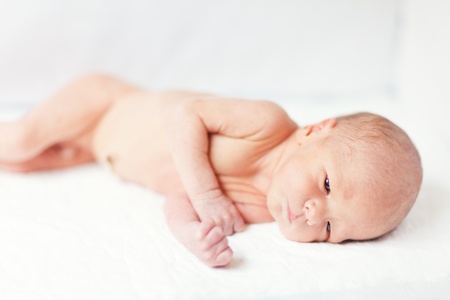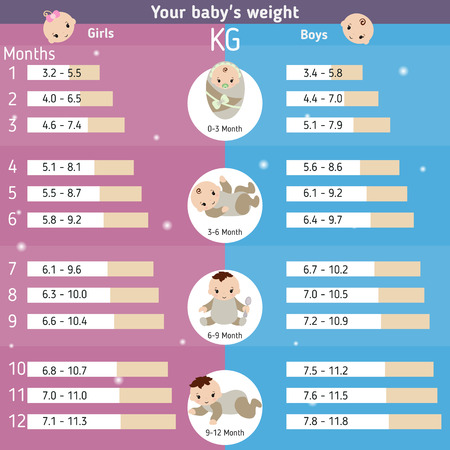Newborn Weight Gain – Post Birth
Once the baby is born and the umbilical cord is cut, the first parameter to be assessed is the cry of the baby followed by the weight. These are considered as important check points by doctors and a matter of great concern for every new mother. If the baby has a very low birth weight which is seen in premature births, then it will be at a risk of failure to survive and will need intensive pediatric care. If the baby is a full term mature baby, then the weight will be checked at the time of birth and again at the time of discharge. A slight drop is expected in the weight check that happens after 24 hours because the baby looses water weight in the first few days after birth. Doctor’s will keep a close watch on the newborn weight gain of the baby as it is an indicator of adequate nutrition and a sign of proper physical and mental development. At every visit to the doctor, the height, weight and the head circumference will be checked. Newborn weight chart by week will be tabulated by the pediatrician in each of these visits. The graph that is formed will give a fair idea of the growth percentile the baby falls in.

Weight Loss After Birth
This is a very normal phenomenon and all full term babies loose 5 to 10 percent of their birth weight in the first one week. This is because babies are born with extra fluids that are eliminated. The weight loss will be more predominant in babies who are overweight as they will lose baby weight. If the weight loss is more than 10% then it is a matter of concern and it could be due to an underlying illness or pathology. Neonatal weight gain is approximately 20 to 30 grams per day depending on their birth weight.
Weight Gain After Birth
After first five to seven days, newborn weight gain is a steady rate. By the time they are two weeks old, the baby gain weight lost in the first week and a little more. This is the normal trend but there are a small percentage of babies who do not gain back the weight so fast. They do so at a slower rate. There is nothing to worry as long as your baby is feeding well and is active.
Factors Affecting the Baby’s Weight After Birth
- Full term baby (born between 38 to 40 weeks) or premature baby
- Gender
- Mothers health during pregnancy and after delivery
- Medical problems in the baby immediately after birth
- Onset of breast feeding
- Feeding effectively or not
- Latching onto the breast
- Formula feeding
Newborn Weight Gain in The First Year
(a) Newborn: Your newborn weight gain begins around the 10th day and do so steadily at the rate of 20 grams per day. This is the average weight gain for breastfed babies. At this stage the baby can eat breastmilk or formula. Baby formula is slightly more difficult to digest and babies who are exclusively formula fed tend to be comparatively heavier. At this stage babies will feed every 2 to 3 hours and this pattern continues till they are 2 months of age.
(b) 6 month old: Gradually as your baby grows, so does the size of his stomach. He is able to retain more milk and so the interval between two feeds begins increasing. By month 6, he is rolling about and also holding his neck straight. The amount of milk per feed will increase by almost one ounce (30 ml) per month. After 6 months, you can add water and wean the baby off by introducing semisolid foods. Baby food and formula should be the main diet at this age. At six months the growth rate is 3 to 5 ounces per week.
(c) 12 month old: By 12 months of age, your baby’s weight should be between 9 to 11 kgs on an average. This will depend on the normal birth weight which is between 2.5 to 3 kgs. By this age the baby should be eating all that is prepared at home. You can make the food less spicy so that the baby can eat it. You can try giving him new food textures and tastes. Searches online for 7 month old baby food ideas are going to be common now.

Is Your Baby Gaining Enough Weight
After the baby is discharged from the hospital, the newborn weight gain cannot be checked each day at home. At each doctor’s visit, the weight is assessed. Between this time, parents get anxious and worried whether their child is growing normally or not. Here are some indications that the child is getting adequate feed and is growing normally.
- Diapers: In the first few weeks, the baby may have few wet diapers. But as the breast milk sets in and the baby begins feeding well, the number of wet diapers will go up. If your baby dirties 5-6 wet diapers a day, it is an indication that he is doing fine. In the early months, babies can poop after each feed. So 3 to 4 poopy diapers are a good enough indication for you.
- Skin tone: If the baby is feeding well, then the skin will be fresh and elastic. If the feeding is poor then the baby’s skin will be dry and shriveled up. Depressed anterior fontanelle is a sign of dehydration in babies and it indicates that you need to give more fluids and milk to the baby.
- Activity: If after a feed, the baby is active and happy it indicates that the feed was sufficient and the resultant will be a normal weight gain and happy child.
The above guidelines are to give you an idea about the normal newborn weight gain pattern. If your baby is losing too much weight or not able to gain weight properly, it could be an indication of an underlying illness or mal assimilation problem. It is advisable to get the child checked up. The doctor may suggest you some foods or nutritional supplements that will help the child to gain weight. Always remember that if your child is happy and active, then a few numbers here and there on the weighing scale should not bother you.




Very useful post!!! You define each and every phase of child weight after birth like weight loss after birth, weight gain after birth, baby weight during each month in first year. The way to define that how weight newborn gain weight is very good. Thanks for this it really helpful for parents to understand the weight cycle of newborn.